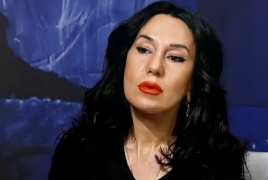
Naira Zohrabyan, head of the Democracy and Security NGO, stated at the Hayeli club that Prime Minister Nikol Pashinyan has no authority to withdraw any lawsuits related to Artsakh from international courts.
She reacted to Pashinyan's recent repeated online declarations of readiness to sign a peace agreement with Azerbaijan, claiming this is a tactic to shield himself from public criticism if Azerbaijan launches another attack.
“He's trying to portray himself as having done everything possible for peace, so he can't be blamed for any future conflict,” she said, as reported by Aravot.am .
Zohrabyan also addressed Azerbaijan's preconditions within the peace agreement framework, listing them as: amending Armenia’s Constitution, dissolving the OSCE Minsk Group, and retracting lawsuits filed against Azerbaijan in international courts. Analyzing the third demand, she stressed its gravity and implications.
“Aliyev demands the withdrawal of all Armenian claims from all international courts—specifically the ECHR and the Hague. I state with full responsibility: if Nikol Pashinyan dares to make a unilateral decision—without a referendum or consulting the people of Artsakh—to retract those lawsuits, which have a strong chance of success, he will be committing yet another act of treason under the Armenian Constitution.”
She recalled that in 2019, Pashinyan publicly declared he had no mandate to represent Artsakh in negotiations. “If you weren’t authorized to negotiate on Artsakh’s behalf, who gave you the mandate to withdraw lawsuits—like the one at the Hague—which already resulted in a ruling obligating Azerbaijan to ensure conditions for the safe return of Artsakh residents?”
She appealed directly to citizens, urging them not to allow Pashinyan to annul lawsuits against Azerbaijan that address war crimes, ethnic cleansing, and the use of prohibited weapons.
“Pashinyan has no constitutional right to revoke any legal claims concerning Artsakh in international jurisdictions.”
Zohrabyan further questioned the potential consequences if Pashinyan acts before being removed from office. According to her, such a move would justify all of Azerbaijan’s past actions—from Ramil Safarov’s murder of Gurgen Margaryan to the complete depopulation of Artsakh.
“If we fail to stop him and he proceeds with withdrawing these lawsuits, we as a nation are effectively endorsing Safarov’s murder of a sleeping Armenian officer in Budapest and legitimizing Azerbaijan’s three-day clearance of Artsakh. It would mean the issue of Artsakh and the right of return for its people is closed forever.”
She added: “Imagine the Swiss Federal Council adopting a resolution urging Azeris and Artsakh Armenians to establish a dialogue on return. And then Pashinyan says: ‘No. I’m withdrawing all international lawsuits.’ This effectively buries the entire Artsakh issue.”
On March 13, Armenia’s Foreign Ministry announced that it had accepted Azerbaijan’s proposals concerning the two previously unresolved articles of the peace treaty. The agreement is now ready for signing, with Armenia expressing readiness to discuss timelines and venues. Azerbaijan, however, has introduced new preconditions and claims it's too early to finalize a meeting date.
The peace agreement draft consists of 17 points, with 15 previously agreed upon. The two unresolved clauses were: the mutual withdrawal of international claims, and the non-deployment of foreign observers along the Armenia-Azerbaijan border.

